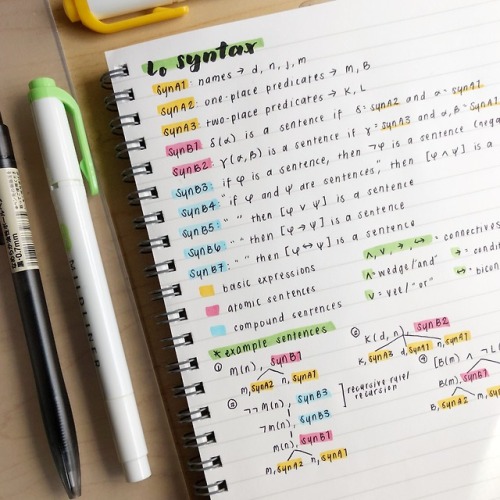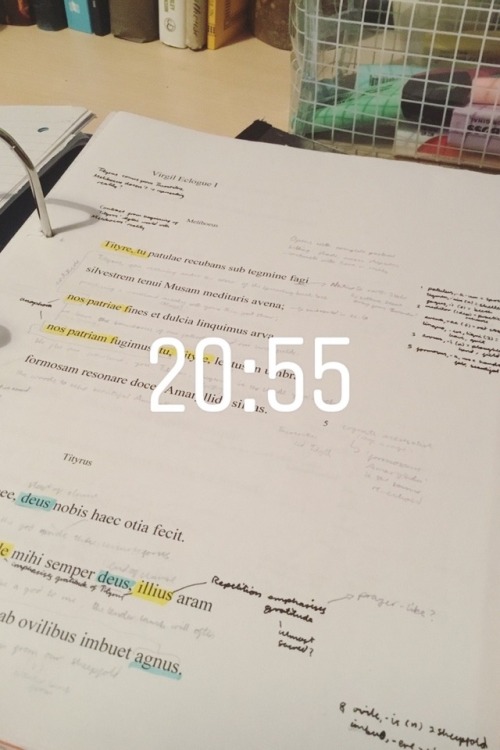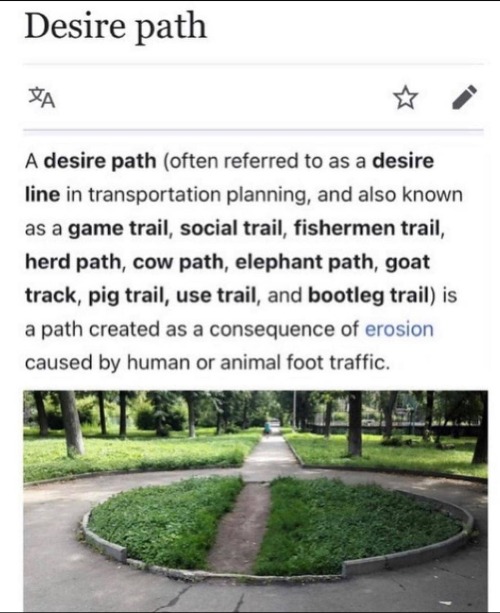Problem Solving Tips That Actually Worked For Me
problem solving tips that actually worked for me
Hey there!
If you have a math, or science related subject (like I always do), you’ll find that you really can’t escape analysis and problem solving, especially if you’re majoring in something science or maths related. So I am here to share some tips that actually made studying technical subjects a little bit easier and manageable for me in college:
Practice solving. If you have a subject that requires you to solve, you really have to practice solving, there is no easy way out of this one. This allows you to develop your own technique in solving the problem. You can start by doing the problems you did in class, then venture out to some examples in textbooks, then further into the problems in the textbooks until you get the hang of how the concepts and theories are applied.
Listen during class. I know, it’s boring. But you have to do this. This way, you’ll be able to understand the topic once it is presented to you. In my opinion, it’s better if you let an expert explain it because they know the important bits in the lesson. Then study it afterwards on your own to develop your own techniques.
Ask your professors. Don’t be afraid to ask questions in class. Or if you’re shy, you can ask them after the class. However, it’s important that you ask them about the lesson when you already did your part; meaning: you already studied the material/solution over and over again but there’s just something that you can’t seem to grasp.
Study before the class. Studying the lesson in advance doesn’t hurt. Plus, it works because you already have an idea about it. However, I don’t do it usually. What I do is that prior the discussion, I study the lessons that are going to be essential to the next topic. Example: Say that our topic later will be about introduction to thermodynamics (which includes derivation of various thermodynamic formulas); what I’m going to study instead is the different integration and derivation techniques, and different basic thermodynamics concepts like laws of thermodynamics. This ensures me that I know the prerequisite lessons of the next topic in class.
Absorb the conceptual parts of the topic first. Before diving into the problems itself, try to digest the concepts or theories behind it first. This way, you can understand which information is important and easily think of a solution because you know the problem’s framework. Even when your professor gives you a problem that seems different from your other sample problems, the concepts will still be the same throughout.
Reverse engineer the solution. Reverse engineering is reading and understanding your solution from bottom to top. I do this to make connections while going through the solution. I usually ask myself “‘where did this come from?’, ‘why did this happen?’, or ‘why is the answer like this?’” It allows me to look into the parts that I missed which are usually concepts or theories that I forgot to apply in solving the problem.
Look for key terms or phrases. There are some problems that put in information that may seem unimportant, but actually is really important. Examples such as the phrases constant velocity, constant acceleration, starting from rest, accelerate uniformly, reversible isothermal, adiabatic conditions, isobaric/isochoric compression/expansion, etc., are easy to miss but actually gives you vital information especially when solving a problem.
Try to ask yourself how or why it happened in every step of the solution. You can do this to gauge your mastery of the lesson. If you can answer yourself confidently, then you’ve studied well enough. But, if you can’t or if you feel that it’s not enough, then you better get your pen, paper, and calculator to practice some more.
If you have to draw it, draw it. Some problems need the use of your imagination, and these problems are the ones that get tricky most of the time. It’s easier to draw each of the time frames that are important so you get the sense of what’s going on between these pictures. This way, you’ll know which information you’re missing and which ones are you failing to take into account.
It’s okay to be messy and slow while practicing. Not all of time you can solve in a tumblr-esque manner because, dude, tumblr notes or solutions are soooo pretty to look at, BUT, what’s more important is that you understand each step of the solution and how the answer came to be 8.0658 m/s directed 32° south of west. So it’s okay to have dashes, strikethroughs, and crosses on your scratch paper, as long as you’re learning, a messy solution on a paper you’re not going to submit to your professor is fine.
IF YOU’VE REALLY GOTTEN THE HANG OF SOLVING IT, try to solve a fresh set of problems as fast and accurately as you can. Try to solve as if you’re in an exam. This is also to gauge how well you’re prepared for it, but you need to do this accurately. I repeat, accurately. It doesn’t work if you’ve finished it in less than an hour but all of your answers are wrong.
Rest. If you know that you’ve done a good job, then take your mind off of everything first and let it wander to wherever it wants to wander. You deserve it ✨
More Posts from Purpletelescope and Others




September 1, 2020 - physics studies.
It's September already! August was a tough month for me and I'm so excited to welcome the better days ahead <33 ☁️ September, please be nice 💫
(ノ◕ヮ◕)ノ*:・゚✧ Keep on working hard and take care of yourself friends ♡
🎶 Dynamite - BTS

february 4, 2018 — rewriting my semantics notes into more cheat sheet looking things!! ╭( ・ㅂ・)و"))
♫ EVERYTHING FROM THE PERFECT RED VELVET
Something I find incredibly cool is that they’ve found neandertal bone tools made from polished rib bones, and they couldn’t figure out what they were for for the life of them.
Until, of course, they showed it to a traditional leatherworker and she took one look at it and said “Oh yeah sure that’s a leather burnisher, you use it to close the pores of leather and work oil into the hide to make it waterproof. Mine looks just the same.”
“Wait you’re still using the exact same fucking thing 50,000 years later???”
“Well, yeah. We’ve tried other things. Metal scratches up and damages the hide. Wood splinters and wears out. Bone lasts forever and gives the best polish. There are new, cheaper plastic ones, but they crack and break after a couple years. A bone polisher is nearly indestructible, and only gets better with age. The more you use a bone polisher the better it works.”
It’s just.
50,000 years. 50,000. And over that huge arc of time, we’ve been quietly using the exact same thing, unchanged, because we simply haven’t found anything better to do the job.









May study challenge day 23!
What type of learner are you (visual, kinetic, etc.)? How does this translate to your study methods?
I’ve never really had one particular learning type that works for me more than others - I try to study in different ways, but I guess my study style fits with a visual learning method more than others?
Today - a photo from a chemistry experiment, reviewing English, chemistry homework, violin practice, piano practice, making chemistry notes, music homework, Latin lit revision, and my cute little productivity tracker with a flower for each day 🌷🌟
This is the best use I have seen of a composition notebook without the pen and highlighter bleeding through! Stunning!


some more notes
How to Defeat Procrastination

How to Defeat Procrastination | A Mini Guide
Use your intrapersonal intelligence. Ask yourself when and why you procrastinate. Use your insights to identify the appropriate strategy to deal with those issues.
Identify a purpose or meaning. Sometimes, it simply isn’t enough to do something for the sake of doing it. Know why you want to do it, it’ll be easier then. List down your goals, and beside it, identify the benefits. So that, when you feel your spirits drooping, you can look at the list be reminded of why you have to do it.
Take charge of the situation. Gather up all the supplies and materials you need to get started. Choose a work environment where you can really really focus on what you are doing. Take responsibility!
Prioritize and stick to the order. When you feel overwhelmed, make a list of tasks that needs to be done. Tackle the high-priority tasks first.
Relax your personal standards. If you’re a serial perfectionist (like me), lower your unrealistically high standards and expectations. You can still continue to produce quality work without it always having to be the BEST.
Face your fear of failure. Focus on your positive traits. I’m hella sure you’ve got plenty of those! Focus on your accomplishments, and the skills you’ve acquired! Go in front of your mirror and tell yourself affirmations and positive pep talks!
Visualize success. Visualize yourself working through the task, feeling positive about your work, and complete the task on time. Believe you can do it and you will!
Be the academic you've always dreamt of being. Stay up till 3 a.m. with your paperbacks scattered on the table and a cup of black coffee, write annotations beside the lines you want to remember, consistently scribble down your notes with your favourite black pen. Absorb whatever your professor says, think about it, come up with questions and hang around in the library pouring over thousands of books trying to quench. that. thirst. for. knowledge. Just do it, stop coming up with excuses that studying can't be romanticised. Live that academia life.
Wow, these are some really really good tips! 😍
6 Things People Don't Always Tell You About Studying
1. you ace tests by overlearning. you should know your notes/flashcards/definitions basically by heart. if someone asks you about a topic when you’re away from class or your notes and you can answer them in a thorough and and accurate answer, then you’re good, you know the material.
2. if you don’t understand something, it will end up on the test. so just don’t disregard and hope that this specific topic won’t be on the test. give it more attention, help, and practice. find a packet of problems on that one concept and don’t stop until you finish it and know it the best.
3. sometimes you just need that Parental Push. you know in elementary school, they would tell you “ok now it’s time for you to do your homework! you have a project coming up, start looking for a topic now!” ONE of your teachers might be like this. be thankful for it and follow their advice! these teachers are the best at always keeping you on track with their calendar. if not a teacher, then have one of your friends be that person that can keep you accountable for the things you promised you would do.
4. you just need to kick your own ass. seriously. i know it sucks and its hard to study for two things at once. BUT. I DONT CARE IF IT’S HARD. you need to do it and at least do it to get it over with because you can’t keep putting things off. If you do, you will eventually run out of time and you will hate yourself. force yourself to do it. i made myself sign up for june ACT even though there’s finals because if i didn’t, i probably never would. like do i think i’m gonna be ready in one month? probably not, SO I BETTER GET ON IT AND START STUDYING!
5. do homework even if it doesn’t count. if you actually try on it, then you will actually do so much better on the tests, it’s like magic.
6. literally just get so angry about procrastinating that you make yourself start that assignment. I know how hard it is to kick the procrastination habit. I have to procrastinate. So I make myself start by thinking about my deadlines way early. I think, “oh i have a presentation in three weeks (but it really takes 2 weeks to do), i’ll be good and start today.” when that doesn’t happen, you say you’ll do it tomorrow, and this happens for like the next four days. I get so mad at myself for not starting when i am given a new chance to do so with every passing day. By that time, you actually have exactly how much time you need for it AND you were able to procrastinate the same way you usually do ;)
-
 pelandrasromis liked this · 1 year ago
pelandrasromis liked this · 1 year ago -
 jay-dozed-off liked this · 2 years ago
jay-dozed-off liked this · 2 years ago -
 ameliejeannelaurent liked this · 2 years ago
ameliejeannelaurent liked this · 2 years ago -
 perfectlyqualitycandy reblogged this · 2 years ago
perfectlyqualitycandy reblogged this · 2 years ago -
 perfectlyqualitycandy reblogged this · 2 years ago
perfectlyqualitycandy reblogged this · 2 years ago -
 hatik21 liked this · 2 years ago
hatik21 liked this · 2 years ago -
 cryptid-of-the-east liked this · 2 years ago
cryptid-of-the-east liked this · 2 years ago -
 winterturtlesstuff liked this · 2 years ago
winterturtlesstuff liked this · 2 years ago -
 gatheryepens reblogged this · 2 years ago
gatheryepens reblogged this · 2 years ago -
 dontwannastudybutihaveto liked this · 2 years ago
dontwannastudybutihaveto liked this · 2 years ago -
 cravingstudyvalidation reblogged this · 2 years ago
cravingstudyvalidation reblogged this · 2 years ago -
 cravingstudyvalidation liked this · 2 years ago
cravingstudyvalidation liked this · 2 years ago -
 lipstickandtearsstxins liked this · 3 years ago
lipstickandtearsstxins liked this · 3 years ago -
 statues-of-snow liked this · 3 years ago
statues-of-snow liked this · 3 years ago -
 h-otiosum liked this · 3 years ago
h-otiosum liked this · 3 years ago -
 hazelgracelancaster2002 liked this · 3 years ago
hazelgracelancaster2002 liked this · 3 years ago -
 lostmyeraser reblogged this · 3 years ago
lostmyeraser reblogged this · 3 years ago -
 bentbookspine liked this · 3 years ago
bentbookspine liked this · 3 years ago -
 theunfocusedbrat liked this · 3 years ago
theunfocusedbrat liked this · 3 years ago -
 enchantedengland liked this · 3 years ago
enchantedengland liked this · 3 years ago -
 ndobi reblogged this · 3 years ago
ndobi reblogged this · 3 years ago -
 hugefatballs liked this · 3 years ago
hugefatballs liked this · 3 years ago -
 germdyke liked this · 3 years ago
germdyke liked this · 3 years ago -
 jayjay-barnes liked this · 3 years ago
jayjay-barnes liked this · 3 years ago -
 schrodingerscatastrophes liked this · 3 years ago
schrodingerscatastrophes liked this · 3 years ago -
 frostiok-1 liked this · 3 years ago
frostiok-1 liked this · 3 years ago -
 prvncecaspian liked this · 4 years ago
prvncecaspian liked this · 4 years ago -
 cactus-extraordinaire liked this · 4 years ago
cactus-extraordinaire liked this · 4 years ago -
 chickenuggin liked this · 4 years ago
chickenuggin liked this · 4 years ago -
 celesolaris liked this · 4 years ago
celesolaris liked this · 4 years ago -
 nylostudiesmath liked this · 4 years ago
nylostudiesmath liked this · 4 years ago


